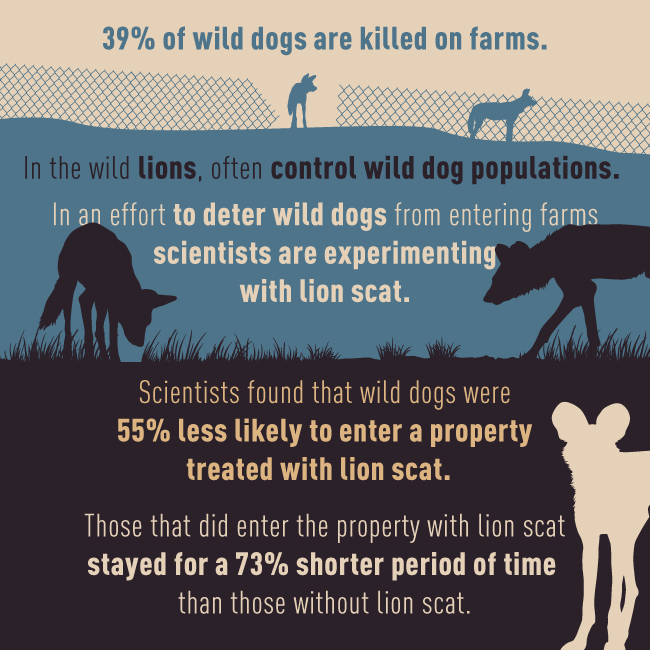Science Snippets: Wild Dogs steer clear of lion scat
Erin Adams and Lizanne Roxburgh, the EWT Conservation Planning and Science Unit
African Wild Dogs (Lycaon pictus) are currently classified as “Endangered” on the IUCN Red List. Within South Africa, there is a free-roaming population, which is a population of Wild Dogs that occur outside of protected areas. This population makes up as much as 20% of South Africa’s population. As they are not within protected areas, natural prey for Wild Dogs is often limited. Therefore, the Wild Dogs may move through private farming lands and consume the livestock and game, which brings them into conflict with the landowners. An estimated 39% of free-roaming Wild Dogs are killed through direct persecution resulting from this conflict. A recent study* co-authored by EWT scientists has tested a novel way of keeping Wild Dogs off private land and safe from persecution.
In their natural environment, dominant predators, such as lions, often control Wild Dog populations. Therefore, scientists aimed to keep Wild Dogs out of certain areas by using the scat of lions as a proxy for lion presence. As some of the Wild Dogs were already fitted with GPS trackers, it was easy to monitor their movements. The scientists tested whether the lion scats alone could deter Wild Dogs from entering private property and causing a threat to livelihoods. Within the study, some properties were treated with lion scat, while others were not treated with lion scat as a control to test the effectiveness of lion scat as a deterrent.

A recent study* co-authored by EWT scientists has tested a novel way of keeping Wild Dogs off private land and safe from persecution.
The scientists found that Wild Dogs were 55% less likely to enter a property treated with lion scat. Those that did enter the property with lion scat stayed for a 73% shorter period than those without lion scat. The scientists also found that some Wild Dog packs were more sensitive to the presence of lions than other packs were, likely due to the packs’ different exposure to and interaction with lions.
The results of the novel approach to managing free-roaming Wild Dogs tested in this study may benefit Wild Dog conservation by reducing conflict with farmers and other landowners. Further studies on using biological cues to control large carnivore movements should be conducted as this could play a significant role in their conservation.
*Haring, R. D., Beverley, G., Thompson, P. N., Taylor, A., & O’Dell, J. H. (2023). Evaluation of lion (Panthera leo) scat as a Wild Dog (Lycaon pictus) deterrent on game farms. Wildlife Research. https://doi.org/10.1071/WR22084.
